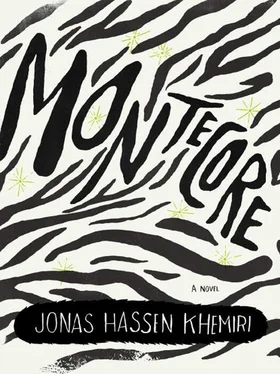Aziz was responsible for the music; soon the volume was levitated and the party was our fact. Just as your father had prophesized, a great quantity of alcohol was needed before the Swedes left their sphere of politeness and attacked the dance floor. But when they did so they bore a frenzy and jerkiness which can most closely be called epileptic. The hippies made circle movements with their hands and limbered their heads like pendulums. The political friends bounced their bodies first unwillingly and then frenetically until the sweat dropped from their nonimperialist beards. Even the Aristocats were attracted to finger-snapping cries of jubilation when Aziz invited your grandmother to dance. Ruth first declined repeated times, but then she suddenly said yes and everyone’s applause claps accompanied Aziz’s instructions for typical eighties dances like the pirouette, the hand clap, the caterpillar (connect-both-hands-together-and-undulate-them-like-a-wave), the mime (pretend-to-walk-into-an-invisible-wall-which-is-then-lurched-to-the-side), the hand shaker (shake-your-hands-above-your-shoulders-like-they-contain-small-dice), and the famous “Michael Jackson owl” (move-your-head-very-quickly-sideways).
Who else was there? I am ransacking my memorizations. Raino, of course, permanently positioned at the bar, toasting solitarily. And those two Chilean brothers who had been welcomed to Sweden after the coup and now projected a theater society localized on the green metro line to the south (unfortunately I remember neither their names nor the metro station’s). And that beautiful friend of your mother’s who had studied in Cairo and attempted to converse me about your father’s “ironic work with the Swedish self-portrait.” While I attempted to discuss … entirely different, considerably more erotic subjects.
In the photos I have from that Saturday, your father’s nervous form is in the majority. First in the morning: updressed in a pressed mint green suit and patterned tie, correcting his cravat pin, and water-combing in front of the mirror in the hall. Then happily smiling with you, draped in a white shirt and overalls. Then his arm around his beautiful wife with a gold-decorated dress and coral necklace. Then distributing a hug as thanks for a bouquet. Then thumbs-up in front of the Silvia photo. Then a photo where his back is marching the hall away toward the storeroom. Then a later photo when your father is standing back in the studio, most of the guests have gone, the dance floor is deserted, some balloons are lying air-free and punctured on the floor, your father’s cheeks are red, his smell a shade modified, filled up by a certain confidence of drink and unnoticing of your mother’s furious background eyes. Then the last photo, when he tipsily waves farewell to the last guests (Aziz and Raino supporting each other like a capital A). Here your father’s smile is strapped on like a fighter pilot’s gas mask, his sweeping movements reduced to two blurry thunderclouds; his voice echoes forth the promise that everyone who wants to will get future family portraits at a reduced price. The opening was a complete success. Right? Who didn’t come?
The journalists.
The publishing people.
The art critics.
The queen.
The most important ones seemed to be conspicuous in their absence.
Here follows a section that we can call “Studio Silvia awaits success.” We wait patiently for the attention of journalists. We observe newspapers in hope of praising reviews, we correspond yet another series of invitations to art critics. The result? A monumental silence.
Three weeks after the opening ceremony, your father received a letter from the Swedish palace. The envelope bore the king’s official seal and the queen’s typed “thanked for the congratulations.” Your father framed the letter behind glass and placed it in the display window, to the right of the photograph that sparked his brain with the idea for the studio’s name.
My official task at Studio Silvia was soon transformed. From photo assistant and makeup-responsible to coffee maker, backgammon player, and general waiter.
Your father tried to putter parallelly with a new artistic collection, but he had difficulty finding inspiration. He noticed that time was limited, that he had invested his wife’s patrimony in an uncertain photographic studio. The future suddenly seemed to glide uncertainly like a water slide.
In the summer of 1986, your day care was annulled to save economy. Instead you spent your time down in the studio in our company. Do you remember those summery days? Do you remember how your child arms helped us spread leaflets in the newly built shopping center, where many retail spaces still stood unrented? Do you remember how we let you sneak into the nursing home and nail leaflets onto the bulletin board? You worked very effectively, although your age was that of a child. And although your father perhaps did not pronounce it in your presence, he was very proud of you. Very, very proud.
Do you remember how we partook our lunches? How we assisted your father when he apart-took his camera? How we began to roar rude Arabic insultations after the customers who invaded the studio, encountered your father’s welcome greeting, and then for some bizarre reason returned out to the courtyard with a regretting exterior? And do you remember how you often imitated your father when he nervously drummed his fingers against the perpetually silent booking telephone; you drummed your small fingers in the exact same rhythm and your father lost his train of thought, silenced the drum, and regarded you, a copy of himself when young, the same suspect imagination, the same speech-related problems. He lovingly patted your cheek. But the telephone continued its silent rest.
And you remember the silence, the ticking of the kitchen clock, the gaze from the blown-up Silvia portrait, the framed letter, and Dads, who drum their fingers, the sun which moves over the courtyard and filters through the curtains, and Dads’ friends, who drink coffee and billow cigs and play backgammon, joke about cheating at dice, and sometimes borrow the bathroom, and once Kadir, who wants to fix the washer in the dripping faucet, the faucet that’s bothered Dads for several weeks but that now they want to keep.
The economic success for Studio Silvia bided its time like a patient meter maid. Your father said:
“Do not worry, Kadir. This is a premier phase. Swedes bear a certain initial suspiciousness, particularly toward us Swedes who do not bear a Swedish appearance. But soon, anytime, our business will take off. In just a few weeks they will realize my artistic talent. Soon there will be lines and guest lists in order to access my photographic services.”
“What shall we do until then?”
“We wait.”
And you remember the waitingand the faucet dripping which continues and Kadir, who again offers to fix it: It’s simple, it can be done in a few minutes, but Dads don’t want to, Dads refuse to let him repair the faucet: I want to keep the dripping! shout Dads suddenly with a slightly too loud voice and you remember that in particular but don’t really understand why. It’s the summer of 1986 and the studio is empty of customers and you’re starting to hang around the neighboring courtyards, starting to explore the shopping center, starting to chat with the drunks and becoming friends with the dry cleaner. And then sometime in the middle of the summer you catch sight of Melinda. And the first time you see each other you both just watch suspiciously from a distance and the second time Melinda shows you her homemade Super Mario belt and the third time you play Indian tiger tamers with extra-long whips and specially made tranquilizer darts. And doesn’t someone get angry at you because of that very game? You don’t remember. But you remember that Melinda soon becomes your first real best friend because Melinda is just like you. Melinda gets why you can think imagination games are fun even though you’ve begun elementary school and Melinda also has a bunch of imaginary friends who really exist but can’t necessarily be seen by regular adults. Melinda agrees that you can play Super Mario Bros. even if you don’t have that new TV game called Nintendo and she just gets mad that time when you suggest that instead of being Mario she should be the princess who must be rescued.
Читать дальше










